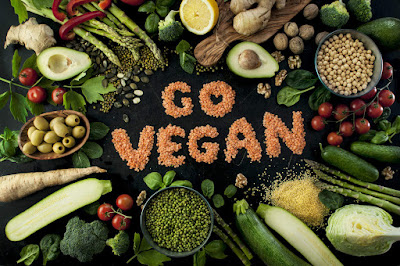A vegan diet excludes all animal products. Many people choose to eat this way for ethical, environmental or health reasons.
You can get most of the nutrients you need from eating a varied and balanced vegan diet.
More and more people are moving to being vegan.
What is causing this sudden change of thoughts? There are are many hardcore non vegetarian who moved to be completely vegan just recently. Let's discuss what might be the reason for that.
More and more people are moving to being vegan.
What is causing this sudden change of thoughts? There are are many hardcore non vegetarian who moved to be completely vegan just recently. Let's discuss what might be the reason for that.
Different Types of Vegan Diets
- Whole-food vegan diet: A diet based on a wide variety of whole plant foods such as fruits, vegetables, whole grains, legumes, nuts and seeds.
- Raw-food vegan diet: A vegan diet based on raw fruits, vegetables, nuts, seeds or plant foods.
- Junk-food vegan diet: A vegan diet lacking in whole plant foods that relies heavily on mock meats and cheeses, fries, vegan desserts and other heavily processed vegan foods.
Although several variations of the vegan diet exist, most scientific research rarely differentiates between different types of vegan diets.
Vegan Diets Can Help You Lose Weight
Vegans tend to be thinner and have a lower body mass index (BMI) than non-vegans.
This might explain why an increasing number of people turn to vegan diets as a way to lose excess weight.
Several randomized controlled studies, which control for these external factors, report that vegan diets are more effective for weight loss than the diets they are compared to others.
"The natural tendency to eat fewer calories on a vegan diet may be caused by a higher dietary fiber intake, which can make you feel fuller."
Vegan Diets, Blood Sugar and Type 2 Diabetes
- Adopting a vegan diet may help keep your blood sugar in check and type 2 diabetes away.
- Several studies show that vegans benefit from lower blood sugar levels, higher insulin sensitivity and up to a 78% lower risk of developing type 2 diabetes than non-vegans
Vegan Diets and Heart Health
A vegan diet may help keep your heart healthy.
- Observational studies report vegans may have up to a 75% lower risk of developing high blood pressure and 42% lower risk of dying from heart disease.
- These effects could be especially beneficial since reducing blood pressure, cholesterol and blood sugar may reduce heart disease risk by up to 46%.
Foods to Eat !!
Health-conscious vegans substitute of animal products with plant products , such as:
· Tofu: These provide a versatile protein-rich alternative to meat, fish, poultry and eggs in many recipes.
· Legumes: Foods such as beans, lentils and peas are excellent sources of many nutrients and beneficial plant compounds. Sprouting, fermenting and proper cooking can increase nutrient absorption
· Nuts and nut butters: Good sources of iron, fiber, magnesium, zinc, selenium and vitamin E
· Seeds: Especially chia and flaxseeds, which contain a good amount of protein and beneficial omega-3 fatty acids
· Calcium-fortified plant: Good sources of calcium for vegans include broccoli, cabbage sesame seeds and tahini prunes, figs and dried apricots
· Whole grains, cereals and pseudocereals: These are a great source of complex carbs, fiber, iron, B-vitamins and several minerals.
· Fruits and vegetables: Both are great foods to increase your nutrient intake. Leafy greens such as bok choy, spinach, kale, and mustard greens are particularly high in iron and calcium.
“Veganism is not a sacrifice. It is a joy.”
- Gary L. Francione




It's so good
ReplyDelete👏👏👏
ReplyDelete👏👏
ReplyDelete